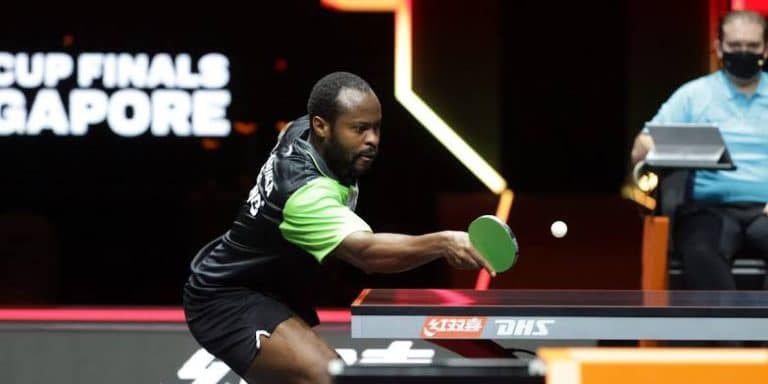Sacrifice, Consistency and Focus: Road that made Aruna Quadri Global Star

Success in sports is rarely accidental. Behind every trophy, medal, or global recognition lies a story of sacrifice, relentless focus, and unyielding determination. For Nigeria’s table tennis sensation, Aruna Quadri, that story is deeply personal and inspiring.
At 36, Aruna is ranked among the best players in the world, a feat that has made him a household name across Africa and beyond. But his rise to stardom was not powered by government support or national investment, it was driven by consistency, personal sacrifice, and private backing.
In a revealing Facebook post, the African champion traced his 15-year professional journey, exposing the harsh realities of being an athlete in a country where sports development often takes a backseat. His words resonated with thousands who saw in him not just a sportsman, but a symbol of resilience.
Aruna left Nigeria for Portugal more than a decade ago, a move that marked the beginning of a new chapter in his career. He plunged into the Portuguese Super League, competing almost every weekend, sharpening his skills, and building the consistency that would later define his career.
For him, the decision to move abroad was not merely about greener pastures. It was about growth, development, and access to opportunities that Nigeria, at the time, could not provide. That decision, bold and uncertain as it seemed then, became one of the biggest sacrifices of his life.
Aruna revealed that he featured in a minimum of 12 tournaments every year. Yet, out of those 12, the Nigerian government funded only one, usually a minor competition within Africa. The rest, he either paid for himself or relied on the generosity of private sponsors.
That imbalance between effort and support highlights the struggle of many African athletes who dream of the world stage. For Aruna, however, it became another reason to push harder. He learned to depend on consistency, discipline, and his unwavering focus on success.
His biggest source of support came from individuals who believed in him. Chief among them was Barrister Wahid Enitan Oshodi, now President of the Africa Table Tennis Federation, whose financial backing and mentorship played a key role in Aruna’s rapid development.
In 2014, when Aruna qualified for the World Cup in Düsseldorf, Germany, it was Oshodi who personally paid for his flight and hotel. His sponsor at the time, Joola, provided him with a German coach, Adomeit. That crucial intervention helped Aruna reach the quarter-finals, an achievement that announced him to the global stage.
Moments like these underline the importance of sacrifice. Without state support, Aruna depended on the kindness and belief of private individuals, combining their help with his own determination to keep moving forward.
Two years later, another private sponsor, Babajebu, stepped in to support him in preparation for the 2016 Rio Olympics. That sponsorship gave him the platform to achieve one of his biggest career highlights, reaching the quarter-finals of the Games, a feat celebrated across Africa.
Yet, for every moment of glory, there were countless challenges. Aruna said he played 99 per cent of his tournaments without a coach, often travelling alone, adjusting his training on the go, and facing top-ranked players with little or no technical backup.
Most athletes would have given up. But for Aruna, the lack of support was not an excuse to quit; it was a reason to double down. His philosophy remained simple: consistency, no matter the odds, would one day yield results.
This philosophy once again came into play at the 2025 World Championships in Doha. The Nigerian government, he revealed, failed to buy his ticket on time. Determined not to miss out, Aruna paid for his own travel.
Even when his Nigerian coach, Dotun Omoniyi, could not continue with him because there was no funding to reschedule his flight, Aruna improvised. He hired a friend from Togo to step in as coach for his Round of 32 clash. With that arrangement, he still fought his way into the Round of 16.
Such resilience speaks volumes about what sacrifice and goal-oriented focus can achieve. While others may have seen roadblocks, Aruna saw stepping stones. His story reminds us that greatness often requires doing the extraordinary in ordinary situations.
Beyond personal achievements, Aruna has consistently used his voice to call for change. He has urged the government to invest in younger players, warning that Nigeria risks losing its place in table tennis without proper development programs.
“It’s time Nigeria begins to invest in the present young players to attend tournaments regularly,” he stressed in his post. For him, the future of Nigerian table tennis should not be built on occasional miracles but on deliberate and consistent investment.
His message is simple: greatness cannot be left to chance. Talent must be nurtured, players must be exposed, and structures must be built. That is the only way to sustain Nigeria’s reputation on the global stage.
Aruna’s career is a testimony to what is possible when sacrifice meets consistency. His achievements, from Portugal’s Super League to the Olympics and World Championships, are proof that focus can turn impossible dreams into reality.
But he is not blind to the cost. His journey has been filled with lonely travels, financial burdens, and moments of uncertainty. Yet, through it all, his consistency ensured that the setbacks did not define him.
For many young athletes in Nigeria and Africa, his story is a beacon of hope. It shows that while structures may be weak and support limited, individual sacrifice and discipline can open doors where none seem to exist.
At the same time, his journey also raises critical questions about governance and accountability. Why should Africa’s number one player have to fund himself while representing his country? Why should private sponsors shoulder responsibilities that belong to the state?
As the debate continues, one thing remains certain: Aruna Quadri’s legacy will not only be measured in medals but also in the inspiration he provides. He has proven that consistency and sacrifice are powerful tools for success, even in the face of neglect.
In the end, his story is not just about table tennis. It is about life itself. It is a reminder that the path to greatness is paved with sacrifices, built on consistency, and guided by a clear focus on goals. For Aruna Quadri, that path has led to global recognition, and for the next generation, it offers a blueprint for achieving success against all odds.




